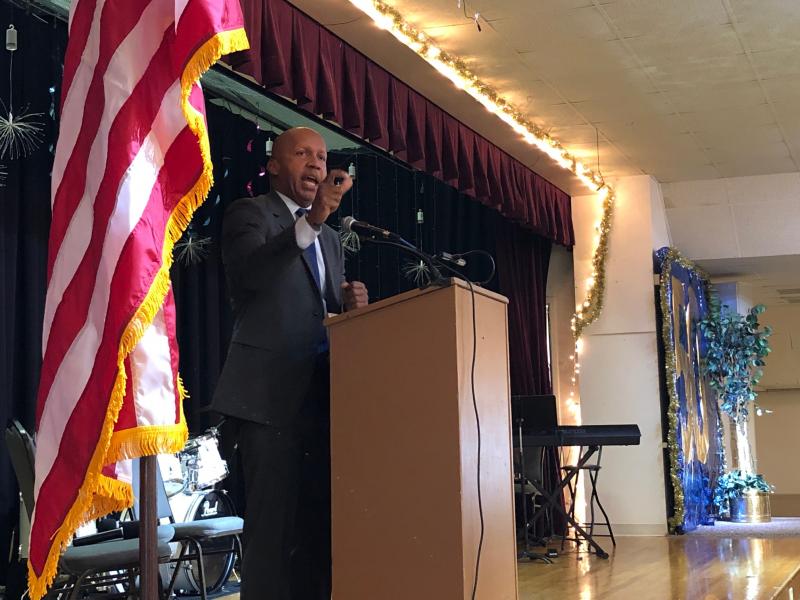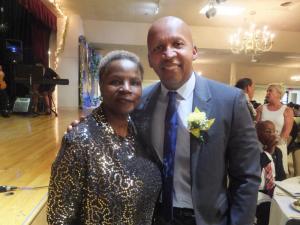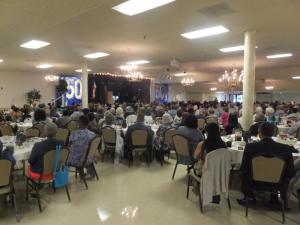Bryan Stevenson: Stay hopeful, embrace the uncomfortable
There are many demands on Bryan Stevenson’s time these days, but in his words, he will always have time for his old church.
Stevenson, a native of Milton and graduate of Cape Henlopen High School, attorney, author, subject of an HBO documentary and soon-to-be subject of a feature film, returned to Delaware Aug. 24 to speak at a fundraiser for Prospect African Methodist Episcopal Church in Georgetown.
“It’s wonderful to be home,” Stevenson said. “There’s so many familiar faces here, faces I knew growing up. I’m really thrilled to be here to support not just Prospect but all the faith communities that have been so vital to this area. We were a family that needed institutions like Prospect to grow and develop, and I want kids in the 21st century have those same support systems.”
The church, which traces its history back to the 1830s, needs a new foundation and handicapped-accessible ramps. The Rev. Janet Maull-Martin said all told, this work will cost $200,000. When looking for a way to help raise money, she reached out to the most famous parishioner of the church for help.
As for the biggest lesson he took from Prospect, Stevenson said, “I think it’s this idea that you have to believe in things you haven’t seen. As somebody who started their education in segregated schools and then saw integration come, and to imagine that we could do things that I hadn’t seen people like me do was really important. I’d never met a lawyer until I went to law school. However, my community made it possible for me to imagine that I could be what I wanted to be.”
Speaking to an audience of more than 400 at Dover’s Modern Maturity Center, Stevenson first announced that he would be donating $10,000 toward the renovation project. Stevenson, who lives in Montgomery, Ala., where he runs the Equal Justice Institute, learned of the state of the church when he was filming the HBO documentary, “True Justice.”
“They weren’t able to have services in the space. And that broke my heart because that place is precious to me,” he said.
Stevenson said at that moment, he pledged to come back to Delaware to help the church. He said Prospect is where he learned to play music, and heard testimony from people who were less fortunate.
“I want to honor Prospect. I want to honor that tradition. I want to honor the AME church. To protect these sacred places where the history of African-American life in this region has to be valued and respected,” Stevenson said.
He spoke about his work trying to reform the American legal system to provide more fairness for people who are not wealthy. Stevenson said the United States has the highest rate of incarceration in the world, and 70 million Americans have criminal arrest histories, hindering their ability to get a job or loan when they get out.
He said the statistic that keeps him up most at night is from the Bureau of Justice, which states that one in three African-American babies is expected to go to jail in their lifetimes.
“We just accepted this indictment of our society and just kept moving,” Stevenson said. “It breaks my heart to see lives that young shattered by such negative expectations.”
He shared four paths for people who want to be part of the solution.
First, he said, is to be proximate to people who are poor or neglected.
“We have to find ways to stand next to people who are suffering,” Stevenson said. “That is the calling of a just community. There is power in proximity. When we get proximate, we hear things we can’t hear from a distance. We see things that we can’t see if we don’t get up close. What we see and what we hear will empower us to change the world. We can’t do it if we stay isolated.”
Stevenson said he’s a direct product of being proximate; that if it weren’t for lawyers working in Sussex County to integrate the school system, he might not have become one himself.
The second change, he said, is changing narratives. The United States has mass incarceration because the country declared a misguided war on drugs, declaring people who were addicts to be criminals and treating addiction as a criminal justice problem instead of a healthcare problem.
“We use a healthcare frame to deal with alcoholism,” Stevenson said. “But with drug addiction, we say, ‘Those people are criminals.’ And we’ve locked up hundreds of thousands of people. We need to change that narrative. We have hundreds of thousands of people in our jails who are not a threat to public safety. They need healthcare.”
He said the country also needs to change the narrative on race. Stevenson said the nation has a history of racial inequality that needs to be discussed in order to move forward.
“Our nation was shaped with this corruption created by these narratives of racial difference, and that’s what made us tolerate two centuries of slavery. I think the true evil of American slavery was this narrative of racial differences we created to justify enslavement,” he said.
Stevenson said narratives about racial inequality continued long after the Civil War. He said recalled as a kid, his father being humiliated in the 1960s when they would go to the movies in Rehoboth Beach and had to sit in “Blacks Only” sections.
“We have to commit ourselves to an era of truth and justice,” Stevenson said. “You have to tell the truth before you can get justice.”
Third, he said, is to stay hopeful. Stevenson said hope is critical.
“Hopelessness is the enemy of justice,” he said. “Injustice prevails where hopelessness persists. If you have hope, you can stand up when other people tell you to sit down.”
Stevenson described meeting icons of the civil rights era, like Rosa Parks, Johnnie Carr and Virginia Durr, and, how even in their old age, they stayed hopeful that racial inequality would end.
Finally, he said, in order to effect change, people have to be willing to do uncomfortable things.
“I tried to find examples of where justice prevailed or equality triumphed and nobody had to do anything uncomfortable or inconvenient. I couldn’t find any examples of that,” Stevenson said.
He said he’s been privileged to have the success he’s had, but there has been pain as well. He recalled a story of a death row inmate whom he was unable to save from execution.
“I had to say to him, ‘I’m sorry, I can’t stop this execution.’ He started sobbing. He could not get out a single word. The more he tried and failed, the more it was breaking my heart. It was so overwhelming,” Stevenson said.
He said he questioned whether he could keep doing this work, but he thought about Prospect and his time there, and hearing stories about being tested, showing love and grace and mercy.
“That was the night I realized why I do what I do. I understand that when we are in need, we can become a servant. You don’t have to be perfect. But you can change the world,” Stevenson said.
Maull-Martin said the church will not have a total on how much was raised from the event until after the Cape Gazette deadline. But it was hard to hide her joy in how the event was received.
“I was just so overwhelmed and pleased,” she said of the fundraiser. “My cup runneth over. It’s really exciting.”
Ryan Mavity covers Milton and the court system. He is married to Rachel Swick Mavity and has two kids, Alex and Jane. Ryan started with the Cape Gazette all the way back in February 2007, previously covering the City of Rehoboth Beach. A native of Easton, Md. and graduate of Towson University, Ryan enjoys watching the Baltimore Ravens, Washington Capitals and Baltimore Orioles in his spare time.























































